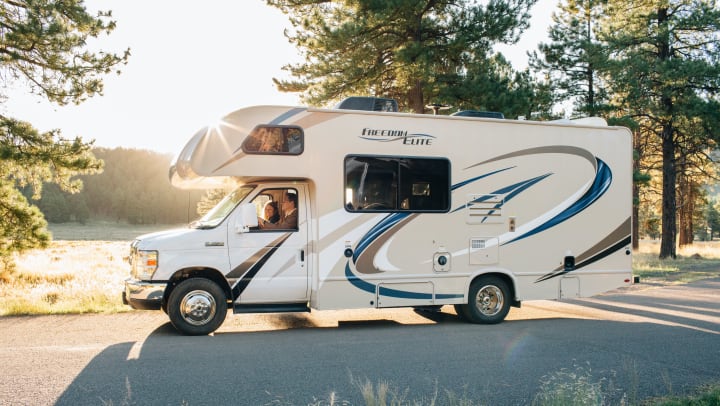Interest in travel and the outdoors is soaring among Americans, and in the last few years, RV sales have skyrocketed. More people are finding that motorhome ownership is a wonderful way to travel, camp, and spend time with family. They’re also finding out—sometimes the hard way—some of the challenges of RV ownership. One of those is RV storage! Many communities prohibit homeowners from parking on their own property. Those living in condos or apartments may find that they cannot park in their facility’s parking lot. People who only have access to street parking, especially in urban areas, may also find it difficult or even illegal to park their RV on the road.
Even for those who can park their RV on their own property, there are downsides. Typically, an RV will be too big for an indoor garage. As such, if you’re leaving it in the driveway, it’s susceptible to damage from inclement weather, being broken into, or just being a hassle since it dominates your driveway.
As such, RV owners should factor in an RV storage strategy—and any associated costs—into their plan for owning an RV. There are many options for RV storage out there, and we’ll give you a rundown of your options below.
Storing an RV in a self-storage unit
Hands-down, one of the best ways to store an RV is in a self-storage unit. This is especially true if you don’t tend to use your RV year-round. If you’re going to put your RV in long-term storage during the winter months, for example, keeping it in a storage unit is the best way to keep it safe from the elements. Most self-storage units are climate controlled, and since they have no windows, your RV will not be exposed to the sun, which can cause long-term damage to the exterior. Of course, it will also not be exposed to inclement weather or extreme temperature changes. Finally, self-storage units provide valuable security features since they often have gated access, may have attendants on staff, and will usually have security cameras. In your own driveway, vandals and thieves are much more likely to strike.
Keeping your RV in a self-storage unit also keeps the RV out of your driveway, of course. That may or may not be a requirement where you live, but regardless, you'll be happy for the full use of your driveway and easier access to your garage if you have one.
You'll have to ensure your storage unit has enough roof for RV storage, so you'll need to know your vehicle's dimensions. Not all self-storage facilities have units large enough to store RVs, but many do. 10x25 is often the minimum sufficient size for the smallest RVs (usually Class B), but most people will find a 10x35 or 15x35 unit well. Some RVs won't even fit in a 10-foot-wide unit, but even for ones that do, 15 offers more room to pull in and out and walk around the RV. The cost difference for that extra 5 feet of width is usually not substantial. The largest RVs will warrant storage unit sizes of up to 10x45, 10x50, 15x45, or 15x50. Make sure you have enough overhead coverage, too! This is usually not a problem, but it's good to double-check before you try to pull in.
Specialty private RV self-storage units
Some self-storage facilities specialize in private RV storage units, which can offer some extra amenities. For example, RV storage facilities may have "dump stations," which are precisely what they sound like—support for owners to offload wastewater and storage tanks. They may also have cleaning stations, offer washing services, charge batteries for you, or more. These tend to be expensive options, but they're great.
Outdoor uncovered RV storage
Outdoor uncovered RV storage spaces are basically like parking spaces in a large parking lot. This is the most affordable option for most people, and it can work for practically anyone, regardless of their RV size or location. The downsides, of course, are that your vehicle will be exposed to the elements, and security will not be as tight.
Outdoor covered RV storage
Outdoor covered RV storage is a step up, offering a protective roof that shields vehicles from the sun's UV rays, inclement weather, and more. Some owners with especially large RVs will also find these a more affordable alternative if they can't spring for a large-sized indoor storage unit or if storage facilities in their area don't offer ones large enough.
Shared indoor RV storage
Shared indoor RV storage offers a reserved space inside a large indoor garage. These facilities often double as boat storage solutions. These are usually a good value for the cost, though they do also have their downsides. For one, they're harder to find than other options, so there might not be a convenient location near you. Secondly, they will sometimes have rules about when you can get your vehicle in or out of the facility, and you may even have to notify them days in advance of your intentions. Some shared indoor RV storage garages also allow 24/7 access, though—it's just something for you to check on when making your decision.
Preparing your RV for storage
Regardless of how you intend to store your RV, there are a few steps you should take.
- Remove all perishable items. Don't leave any food items in your RV, and don't leave trash in the trash bin. Not only will these items rot and cause a sanitation issue, but they may also attract pests.
- Prop open your refrigerator doors. Propping open the fridge door helps prevent mold from growing and is often overlooked by new RV owners.
- Remove all valuables. This is less of a concern if you're storing your RV in a privately-accessible self-storage unit, but it's still a good idea. Thieves sometimes target RVs because they often contain valuable electronics; when they're in storage, criminals know they're unattended.
- Clean lines and drain tanks. Clean out waste tanks and water tanks.
Take good care of your motorhome, and it will last you for decades! You'll spend less time worrying, less money on costly repairs, and more time enjoying the open road. Remember, RV stands for "recreational vehicle." Owning one should be fun. Get some good use out of it, and invest in a storage solution that keeps you cruising longer.


